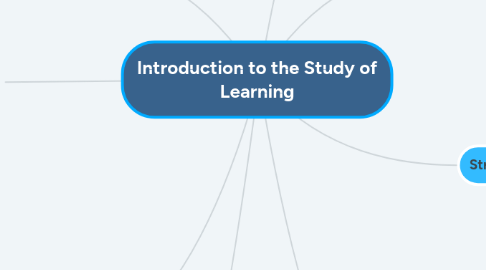
1. which factors influence it
2. Two positions on the origin of knowledge
2.1. Rationalism
2.1.1. Rationalism refers to the idea that knowledge derives from reason without recourse to the senses.
2.2. Empiricism.
2.2.1. contrast to rationalism, empiricism refers to the idea that experience is the only source of knowledge.
3. Criteria of learning.
3.1. Learning involves change
3.1.1. People learn when they become capable of doing something differently.
3.2. Learning endures over time
3.2.1. this excludes temporary behav- ioral changes (e.g., slurred speech) brought about by such factors as drugs, alcohol, and fatigue. Such changes are temporary because when the cause is removed, the behavior re- turns to its original state.
3.3. Learning occurs through experience
3.3.1. This criterion excludes behavioral changes that are primarily determined byheredity, such as maturational changes in children (e.g., crawling, standing).
4. LEARNING THEORY AND RESEARCH
4.1. Functions of Theory
4.1.1. A theory is a scientifically acceptable set of principles offered to explain a phenomenon. Theories provide frameworks for interpreting environmental observations and serve as bridges between research and education.
4.2. Learning research paradigms.
4.2.1. Correlational
4.2.1.1. Examines relations between variables
4.2.2. Experimental
4.2.2.1. One or more variables are altered and effects on other variables are assessed
4.2.3. Qualitative
4.2.3.1. Concerned with description of events and interpretation of meanings
4.2.4. Laboratory
4.2.4.1. Project conducted in a controlled setting
4.2.5. Field
4.2.5.1. Project conducted in a natural setting (e.g., school, home, work)
5. Learning involves
5.1. acquiring and modifying
5.1.1. knowledge
5.1.2. skills
5.1.3. strategies
5.1.4. beliefs
5.1.5. attitudes,
6. People learn
6.1. Cognitive
6.2. Linguistic
6.3. Motor
6.4. Social Skills
7. Learning is an enduring change in behavior, or in the capacity to behave in a given fashion, which results from practice or other forms of experience.
8. Structuralism and Functionalism
8.1. Structuralists a method of interpretation and analysis of aspects of human cognition, behavior, culture, and experience that focuses on relationships of contrast between elements in a conceptual system that reflect patterns underlying a superficial diversity
8.2. Functionalism: a theory that views society as a complex but orderly and stable system with interconnected structures and functions or social patterns that operate to meet the needs of individuals in a society.
9. Assessment of learning
9.1. Direct observations
9.1.1. Instances of behavior that demonstrate learning
9.2. Written responses
9.2.1. Written performances on tests, quizzes, homework, papers, and projects
9.3. Oral responses
9.3.1. Verbalized questions, comments, and responses during learning
9.4. Rating by others
9.4.1. Observers’ judgments of learners on attributes indicative of learning
9.5. Self-reports
9.5.1. People’s judgments of themselves
9.5.1.1. Questionnaires
9.5.1.2. Interviews
9.5.1.3. Stimulated recalls
9.5.1.4. Think-alouds
9.5.1.5. Dialogues
